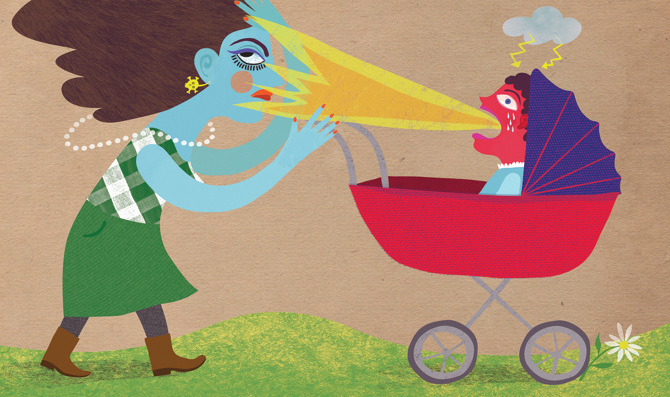The No. 1 brand in the entire world isn’t Apple, or Exxon, or Google, or anything like that … it’s motherhood. That’s the most tied up in “should-be good” feelings, the future of our world, and everything that we’re taught is supposed to matter greatly to us. We deify the busy mom — the super woman! — and we cast aspersions, however real or not real, on people without kids (“selfish!”) or moms who mess up a lot. This has been the process for generations; it will be the process for more generations to come. This is, essentially, life.
I hate seeing families not be as close. It happens to all families in some small degree — adolescent rebellion, etc. — and then it probably happens to about 1 in 2 families at the high level (divorce) or some other level (death, etc.) It’s sad. Families are the true cornerstone of society; it’s not corporations or law or anything like that. It’s families, neighborhoods, and connections. That’s what makes us, and keeps us, human. We’re social animals.
Here’s the thing people often forget, though: for families to grow, and generations to improve on each other, you actually need to realize your parents have some flaws. Let me explain.
I wrote about this once before — if your parents’ marriage is bad (or good), will yours be bad (or good)? No one really knows, although there is a bunch of research about it.
I like to observe people, and often I do so in a horribly flawed way, but often I’m also moderately successful. (Phrased another way: I’m a human being.) Here’s what I’ve seen on parents and children as each side gets older, and admittedly this isn’t scientific per se:
- Some kids absolutely deify their mothers, into adulthood.
- Some kids love their mothers and realize they have flaws, just like any human being walking amongst us.
- Some kids hate their mothers for X or Y reason, and that carries into adulthood.
You’d assume on face that “Group 1” would do great with their own kids, because I mean, they love and adore their mother, and clearly that’s a two-way street, and when their kids are born, the grandmother is going to be a super source of support.
You’d then assume “Group 2” and “Group 3” might have some struggles, no? Especially Group 3.
Here’s the deal I’ve seen: most people I know, “Group 1” is the biggest train wreck, “Group 2” is the most-adjusted, and “Group 3” does better than expected.
Here’s the problem with “Group 1.” People are flawed. If you believe even an iota or a word of the Bible, there’s essentially one perfect person that ever walked the Earth. (And we nailed him to a cross, so there’s that…) Your mother is flawed. She could be the most perfect, most loving, best cook, best healer, best scheduler of events, etc… she still has flaws. We all do.
When you can’t see those flaws, you’re just going to parent the same way she did, and carry your flaws + her flaws down the line. That doesn’t help anyone. That’s not actually growth.
I know people hate discussing failure — and families probably hate it more than anyone — but the thing is, failure is growth. You can’t grow just from success, because then there’s no context for anything. You want to solve any kind of problem in your life? Struggle has to go with insight.
Lest you’re still reading and you think “Jesus Christ, man, are you throwing your mother under a bus on Mother’s Day?”, well, no.
See, here’s the thing: I love my mother more than maybe anyone else in my life. She’s a tremendous woman and she made a ton of sacrifices for me. I wouldn’t be the type of person I am (insofar as anyone views that as valuable, of course) without her. She’s awesome.
But does my mother have flaws? Yes.
And honestly, I felt like the first transitional steps for me towards adulthood — which I’ve probably not really arrived at yet, honestly — were when I understood, “My parents are people too. They flaws and issues and worries and concerns and they mess up.”
Then I have friends who absolutely adore everything their mom does. She could be a total train wreck for months at a time, and those kids will say “No, she’s OK! That’s just mom!” Blinders on. All families do this to some extent. It’s not like I’m sitting here writing down some totally new idea. But I’ve seen those kids grow up and have kids of their own, and it’s all hide-hide-hide-hide-what’s-really-happening and “Well, mom did this so we’re gonna do this too,” even if that doesn’t work for the third generation.
That shit is hard.
And if you think for a second that you can get married to a person and deify your own parents and have them subsequently deify your parents too, well, there’s an unicorn in your kitchen. The entire way that having in-laws works is that you figure out what’s wrong with them faster than your spouse can (works on both sides of the equation), you try to convince your spouse of some aspects of this, your spouse pushes back, and then, years later, you’re kinda in agreement that both sides are a wreck in their own glorious ways — unless, of course, you worship at the altar of Group 1 above.
My basic point here, although I elaborated it too much, is pretty simple: if you want to grow up and develop the next generation and move things forward and move yourself further into adulthood, love your mother with every ounce of your heart — but also realize she’s not a perfect person either.


Reblogged this on Gr8fullsoul.